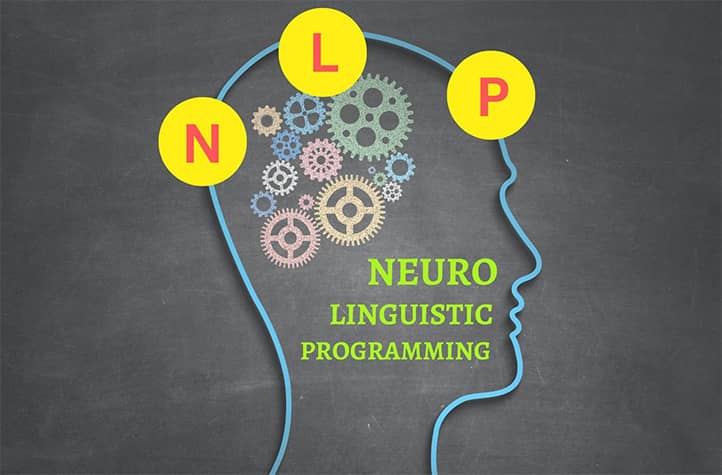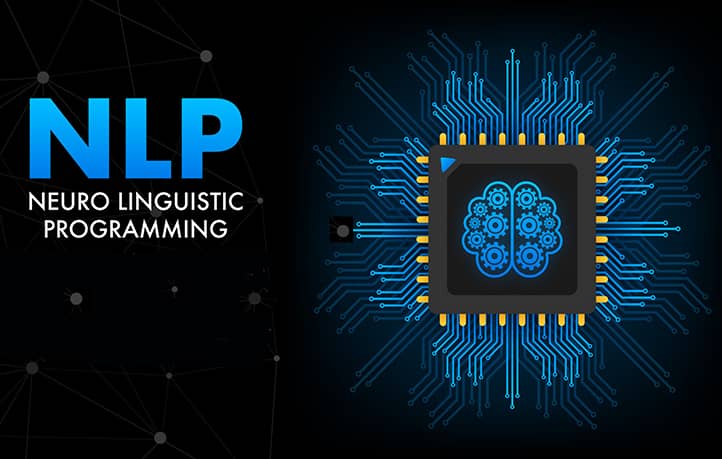Neuro-Linguistic Programming (NLP) is an approach to communication, personal development, and psychotherapy developed in the 1970s. Since its inception, NLP has sparked lively debates within scientific and practical circles. Proponents claim it is an effective method for achieving personal and professional goals, while critics label it as pseudoscience. In this article, I will take a detailed look at NLP, its history, concepts, applications, criticism, and scientific research, to help you form your own opinion on its status and effectiveness.

The History of NLP
The origins of Neuro-Linguistic Programming trace back to the turbulent 1970s, an era marked by cultural shifts and a reevaluation of traditional approaches to psychology and personal development. This period saw a surge of interest in alternative methods of psychotherapy and self-development, ranging from transcendental meditation to experimental forms of group therapy.
California, known for its reputation as a center of counterculture and innovation, became an ideal ground for new ideas in the field of human potential. University campuses, like the one where Bandler and Grinder met, were buzzing with energy and a desire for change, fostering an atmosphere conducive to interdisciplinary experimentation.
The influence of cybernetics and systems theory on the development of NLP is often underestimated. Concepts like feedback and self-regulating systems, popular in technical circles of the time, found an unexpected application in the field of human communication and behavior.
Founders: Richard Bandler and John Grinder
Neuro-Linguistic Programming was developed in the early 1970s by Richard Bandler, a student of mathematics, and John Grinder, a linguist. Their collaboration began at the University of California, Santa Cruz, where they studied and modeled the methods of successful psychotherapists of that time.
The personal backgrounds of the founders, their education, and previous experiences played a key role in shaping the approach. Bandler’s background in mathematics and Grinder’s expertise in linguistics created a unique blend of analytical and linguistic approaches to modeling human experience.
Context of the 1970s
The 1970s was a period of active development for various psychotherapeutic approaches and the human potential movement. In this context, Bandler and Grinder focused on studying the work of three prominent therapists: Fritz Perls (founder of Gestalt therapy), Virginia Satir (family therapist), and Milton Erickson (renowned hypnotherapist).
The founders of NLP aimed to identify the communication patterns and techniques that made these therapists particularly effective. They claimed to have identified key elements of successful therapy and to have created a model that could be applied across various contexts—from psychotherapy to business and education.

Neuro-Linguistic Programming: Key Concepts and Techniques
Neuro-Linguistic Programming is based on a number of assumptions about the nature of human perception and information processing. These assumptions, although not always scientifically validated, form the foundation for the development of practical techniques and methods.
The concept of the “map of reality” in NLP resonates with ideas of constructivism in philosophy and psychology. It emphasizes the subjectivity of human experience and the importance of understanding individual ways of interpreting the world.
NLP techniques often borrow elements from various psychotherapeutic approaches, adapting them to its theoretical framework. This eclectic mix of methods reflects NLP’s focus on practical effectiveness, sometimes at the expense of theoretical coherence.
Language plays a central role in NLP practice, reflecting the linguistic roots of the approach. Special attention is given to nuances of verbal and non-verbal communication, suggesting that subtle changes in language patterns can lead to significant shifts in perception and behavior.
Representational Systems
One of the key ideas of Neuro-Linguistic Programming is that people perceive and process information through various sensory channels or “representational systems.” Three primary systems are distinguished:
- Visual (sight)
- Auditory (hearing)
- Kinesthetic (feelings and sensations)
According to NLP, each person has a preferred system, and understanding this can help improve communication and learning.
Anchoring
Anchoring is a technique based on the principles of classical conditioning. It involves creating a connection between a specific stimulus (anchor) and a desired state or response. For example, touching a shoulder might be associated with a feeling of confidence.
Reframing
Reframing is the process of changing the frame through which a situation or experience is perceived. Neuro-Linguistic Programming offers two types of reframing:
- Context Reframing: Changing the context in which a situation is perceived.
- Content Reframing: Changing the meaning of the situation itself.
The goal of reframing is to help a person see a situation in a new, more positive, or productive light.
The Meta-Model of Language
The Meta-Model of Language is a set of linguistic patterns designed to clarify and specify information in communication. It aims to identify distortions, generalizations, and omissions in a person’s speech, helping them express their thoughts and experiences more accurately.

Claimed Benefits and Applications of NLP
The versatility of Neuro-Linguistic Programming principles allows its proponents to claim a wide range of potential applications, from clinical psychology to sports performance. This flexibility attracts those looking for a unified approach to solving diverse personal and professional challenges.
The promise of quick and effective changes, characteristic of many NLP techniques, resonates with modern culture’s preference for instant gratification. In a world where time is considered a valuable resource, the idea of quickly overcoming phobias or changing deeply ingrained beliefs appears especially appealing.
The integration of NLP into the corporate environment reflects the growing interest of businesses in “soft skills” and emotional intelligence. NLP techniques focused on improving communication and influence seem particularly relevant in the context of contemporary leadership and management theories.
The application of NLP in education raises questions about the nature of learning and optimal methods for knowledge transfer. The idea that considering individual information-processing styles can significantly enhance learning effectiveness resonates with educators seeking innovative approaches to education.
Psychotherapy
In psychotherapy, Neuro-Linguistic Programming is offered as a method for addressing various issues, including phobias, anxiety, depression, and post-traumatic stress disorder. NLP techniques, such as the “fast phobia cure” and “visual-kinesthetic dissociation,” are claimed to be effective ways to quickly change undesirable emotional reactions.
Coaching and Personal Growth
Neuro-Linguistic Programming is widely used in coaching to set and achieve goals, increase motivation, and overcome personal limitations. NLP techniques, such as the “well-formed outcome” and “parts work,” are applied to help clients achieve desired changes in their lives.
Business and Sales
In the business environment, Neuro-Linguistic Programming is promoted as a tool for improving communication, negotiating, and enhancing sales effectiveness. Techniques for building rapport and mirroring body language and speech patterns of the interlocutor are considered useful for building trust with clients and partners.
Education
In education, Neuro-Linguistic Programming offers methods for improving the learning and teaching process. Understanding the preferred representational systems of students can help in designing more effective educational materials and teaching methods.

Criticism of NLP
The scientific community’s skepticism toward Neuro-Linguistic Programming is largely connected to the broader context of fighting pseudoscience in psychology. Amidst the growing movement for evidence-based practice, unverified and theoretically weak NLP methods raise particular distrust.
The problem of replicating results, relevant to the entire field of psychology, is particularly acute in relation to NLP research. The lack of standardized protocols and clear operational definitions of key concepts complicates conducting reliable and reproducible research.
The criticism of Neuro-Linguistic Programming also reflects a broader discussion about the role of theory in psychological practice. While NLP supporters emphasize the importance of practical effectiveness, critics point to the need for a consistent theoretical foundation to understand mechanisms of change.
Ethical issues raised by critics of NLP partly reflect public concerns about the potential of psychological techniques for manipulation. In an era of information wars and fake news, methods promising effective influence on people’s thinking and behavior cause particular concern.
Lack of Scientific Basis
One of the main arguments of NLP critics is the lack of a solid scientific basis. Many NLP concepts, such as representational systems and “eye access cues,” lack sufficient empirical support in scientific research.
Lack of Empirical Evidence of Effectiveness
Despite numerous success stories, Neuro-Linguistic Programming lacks sufficient reliable scientific research confirming its effectiveness. Many studies conducted by NLP proponents are criticized for methodological flaws and the absence of control groups.
Ethical Issues
Critics also raise ethical concerns, particularly regarding the potential use of NLP techniques for manipulation. Some techniques, such as “matching and leading,” may be perceived as methods of covert influence on people without their conscious consent.

Arguments in Defense of NLP
Supporters of Neuro-Linguistic Programming often appeal to pragmatism, asserting that the practical effectiveness of techniques is more important than their theoretical basis. This argument reflects a broader philosophical debate on the nature of knowledge and the criteria for truth in applied disciplines.
NLP’s flexibility and adaptability can be viewed as an advantage in the context of a modern understanding of the complexity and individuality of human experience. The preference for an individualized approach over rigid protocols aligns with trends in personalized medicine and education.
Some proponents of NLP point to the potential role of the placebo effect and self-fulfilling prophecies in achieving results. This raises interesting questions about the role of expectations and belief in the effectiveness of psychological interventions in general.
The argument that NLP is ahead of its time and therefore cannot be adequately evaluated by existing scientific methods reflects a broader discussion on the boundaries of scientific knowledge and the possibilities of studying complex psychological phenomena.
User reviews on practical effectiveness
NLP supporters often point to numerous positive reviews from people who have undergone training or therapy using Neuro-Linguistic Programming techniques. Many clients and practitioners report significant positive changes in their lives and professional activities.
Possible explanations for effectiveness mechanisms
While the scientific basis for many NLP concepts remains controversial, some researchers propose possible explanations for the effectiveness of individual techniques. For example, the anchoring technique can be explained in terms of classical conditioning, and some aspects of the meta-model of language may find parallels in cognitive-behavioral therapy.

Scientific research on NLP
Research on Neuro-Linguistic Programming encounters a fundamental problem of operationalizing key concepts. How can “rapport” or “congruence” be measured? These methodological challenges reflect the broader difficulties of studying subjective psychological phenomena.
The question of which research paradigms are most suitable for studying NLP remains open. Traditional quantitative methods may overlook important qualitative aspects of experience, while qualitative research is often criticized for lacking generalizability.
The lack of a clear consensus on the mechanisms of action in Neuro-Linguistic Programming complicates the development of adequate experimental designs. This reflects a more general problem in psychology: how to study complex interventions whose effects may be due to many interacting factors.
Overview of existing research
Scientific studies on NLP yield mixed results. Some studies show positive effects of certain Neuro-Linguistic Programmingtechniques, especially in the field of communication and psychotherapy. However, most systematic reviews and meta-analyses do not find sufficient evidence of NLP’s overall effectiveness.
Many studies on NLP are criticized for methodological shortcomings, such as small sample sizes, lack of control groups, and issues with operationalizing key concepts. This makes it difficult to draw definitive conclusions about the effectiveness of Neuro-Linguistic Programming as a comprehensive approach.
It is worth noting that certain techniques associated with NLP, such as specific types of visualization or work with submodalities, may have positive effects in specific contexts. However, these effects do not necessarily validate Neuro-Linguistic Programming as a comprehensive theory or practice.
Methodological challenges in studying NLP
Research on NLP effectiveness faces a number of methodological challenges:
- The variety of techniques and lack of standardized protocols make it difficult to compare results from different studies.
- The complexity of controlling for the placebo effect and expectation effect in psychotherapeutic research.
- Difficulties in operationalizing and measuring some NLP concepts.

Neuro-Linguistic Programming in the context of modern psychology and neuroscience
The development of cognitive neuroscience offers new opportunities for rethinking some NLP concepts. Research on neuroplasticity and the formation of neural connections may provide new perspectives for understanding the processes of change postulated in Neuro-Linguistic Programming.
Contemporary theories of embodied cognition resonate with some NLP ideas about the connection between bodily states and cognitive processes. This opens potential avenues for integrating NLP ideas with contemporary scientific paradigms.
The growing recognition of individual differences in psychology and neuroscience may provide a new context for rethinking the concept of representational systems in NLP. Research in cognitive styles and neurodiversity could enrich our understanding of individual information processing characteristics.
The development of neuroimaging methods opens up potential opportunities for empirically testing some of NLP’s claims about the relationship between language patterns, visual information processing, and emotional states. This could lead to a deeper understanding of the neurobiological foundations (or refutation) of some Neuro-Linguistic Programming techniques.
Comparison with evidence-based methods
In modern psychotherapy, preference is given to methods with scientifically proven efficacy (evidence-based therapy). These methods include cognitive-behavioral therapy, dialectical behavior therapy, and metacognitive therapy. Unlike NLP, these approaches have a solid theoretical foundation and are supported by numerous clinical trials.
Possible intersections with scientific approaches
Despite criticism, some ideas and techniques in Neuro-Linguistic Programming find parallels in modern scientific research:
- The concept of representational systems may correlate with research on cognitive styles and individual differences in information processing.
- Reframing techniques bear similarities to cognitive restructuring in cognitive-behavioral therapy.
- Some aspects of working with “internal parts” of the personality may be reflected in multiple “self” concepts in modern personality psychology.

Ethical aspects of using NLP
The use of Neuro-Linguistic Programming techniques in therapy raises questions about the boundaries of professional competence. How to ensure the safety and well-being of clients, given the lack of standardized training and accreditation of NLP practitioners?
The use of NLP in business and marketing raises concerns about the manipulative potential of these techniques. In an era of growing attention to ethical business practices and social responsibility, how to balance effectiveness with the ethics of communication strategies?
The use of NLP in education raises questions about its influence on the worldview and values of students. How can techniques aimed at increasing learning effectiveness stay within the bounds of influence without crossing into manipulation?
The potential use of NLP techniques in political communication and propaganda raises serious ethical concerns. In the context of global challenges to democracy and information security, how should the application of methods for influencing public opinion be evaluated and regulated?
Risk of manipulation
One of the main ethical issues associated with Neuro-Linguistic Programming is its potential for manipulation. Some NLP techniques, especially in the context of sales and marketing, can be perceived as methods of covertly influencing people’s behavior. This raises questions about the boundaries of permissible influence and respect for personal autonomy.
Informed consent issues
In the context of psychotherapy and coaching, it is essential that clients are fully informed about the nature and status of NLP. Given the ongoing debates about the scientific basis of Neuro-Linguistic Programming, ethical practice should include providing clients with information about the current status of NLP in the scientific community and possible alternatives.

Final considerations
Neuro-Linguistic Programming remains a controversial field that evokes both enthusiasm and skepticism. Arguments in favor of NLP include numerous positive user reviews, practical applicability in various fields, and the potential for rapid change. Critics, in turn, point to the lack of scientific evidence, methodological issues in research, and ethical concerns related to the potential for manipulation.
At present, Neuro-Linguistic Programming occupies an intermediate position between recognized scientific methods and alternative practices. While some NLP techniques may be effective and find parallels in evidence-based approaches, NLP as a whole does not meet the criteria for scientifically proven practice. This does not mean that Neuro-Linguistic Programming cannot be useful in certain contexts, but it requires a cautious and critical approach to its application.
To more clearly define the status of NLP, further research is needed using rigorous scientific methods. Future research could focus on the following aspects:
- Conducting large-scale randomized controlled trials of individual NLP techniques in comparison with established treatment methods.
- Studying the neurobiological basis of the supposed effects of NLP using modern neuroimaging methods.
- Developing standardized protocols for applying NLP to specific problems, allowing for more reliable comparative research.
- Investigating the long-term effects of NLP application in various contexts: psychotherapy, coaching, education, business.
- Studying factors that influence NLP effectiveness, such as practitioner personality, client expectations, and context of application.
It is essential that future research addresses the criticisms of previous studies and strives for maximum objectivity and reproducibility of results.

Practical recommendations
Given the current status of Neuro-Linguistic Programming, the following recommendations may be helpful for those interested in or using these techniques:
- Critical Thinking. Approach NLP with an open but critical mind. Do not accept claims about its effectiveness at face value without sufficient evidence.
- Individual Approach. Remember that the effectiveness of NLP can vary from person to person. What works for one person may not work for another.
- Combined Approach. Consider combining Neuro-Linguistic Programming techniques with scientifically validated psychotherapy or personal development methods.
- Ethical Application. If you apply NLP techniques in psychotherapy, ensure that you do so ethically, with full disclosure to clients about the nature and status of NLP.
- Continuous Education. Stay up-to-date with the latest research in Neuro-Linguistic Programming and related fields in psychology and neuroscience.
- Skepticism of Exaggerated Claims. Be cautious of claims about “quick fixes” or “magical changes.” Real change usually requires time and effort.

Final thoughts
Despite the popularity of Neuro-Linguistic Programming and numerous reports of its effectiveness, NLP’s scientific status remains in question.
Neuro-linguistic Programming can be seen as a set of techniques and approaches that may be useful in certain contexts, especially in the areas of communication and personal development. However, it is important to understand that many of the foundational principles of NLP lack sufficient scientific validation.
The future of NLP will depend on its proponents’ ability to adapt to the demands of modern science, conduct high-quality research, and integrate their ideas with advancements in cognitive psychology and neuroscience.
Ultimately, the decision to use NLP techniques should be made individually, taking into account available scientific data, personal goals, and ethical considerations. It is important to remember that in the field of personal development and psychological support, there are no universal solutions, and Neuro-Linguistic Programming, like any other approach, should be viewed as one possible tool rather than a panacea.
Regardless of whether you consider Neuro-Linguistic Programminga pseudoscientific approach or a functioning method, its influence on the development of communication practices and personal growth techniques cannot be denied. Further research and open dialogue between supporters and critics of NLP can lead to a deeper understanding of the mechanisms of human thinking and behavior, ultimately benefiting everyone striving for personal and professional development.




